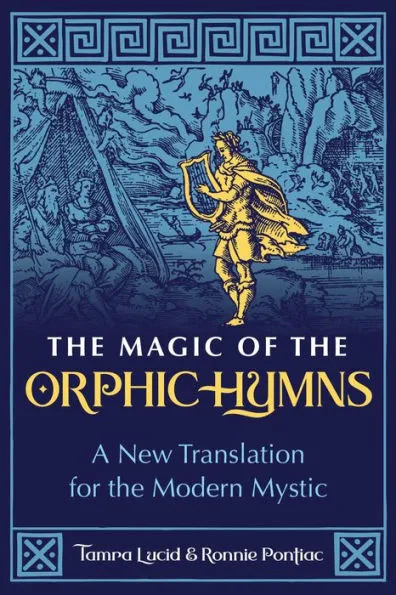The Orphic Hymns are a collection of ancient chants or poems dedicated to a range of Greek and Mesopotamian deities. They have been and continue to be used for rituals and magic.
The origins of Orpheus and the poems are swathed in historic mysteries. The authors devote thirteen chapters to sifting through testimony from ancient writers, historic artifacts, and similar mythic narrative threads from other cultures. The text examines the period when the Orphic Hymns were most likely written (the Severan dynasty period, early 3rd century), and delves into the question of whether or not Orphism was an actual religious cult or a more diffuse and personalized practice in the hotbed of late Roman Empire religious experiments. Orphism was certainly influential on the neo-Platonists, and the authors expound on the links between the earliest Greek poets, Pythagoras, Plato, Aristotle, and late classical writers like Iamblicus and Proclus.
The narrative moves forward into the Renaissance when the Orphic Hymns were re-discovered and translated by Marsilio Ficino, and proceeds into an engaging catalog of works of art, music, theater, cinema, and dance inspired by the myth of Orpheus and Eurydice. An intriguing section of the book focuses on the poetry of 20th century feminists giving a voice to the nearly-invisible Eurydice and turning Orpheus into an overweening narcissist.
Another point of examination is the dramatic and creative impact of the “backward glance” that severs Orpheus from Eurydice forever. The exploration moves into more recent history and the changing views of scholars from the late 19th to the early 21st centuries. The legend of Orpheus has inspired symbolists, surrealists, cubists, the beatniks, and subsequent generations of creative work.
The second part of the book presents the new translations of the Golden Leaves and Orphic Hymns (pp. 120 – 242). The word “translation” is used very loosely, as this iteration of Orphic materials has been adjusted with some creative license for contemporary use, as indicated in the subtitle of the book. Supplemental hymns to relevant deities omitted in the original were composed by the authors (I wish these had been distinguished with the authors’ initials). As a fan-girl of the 2013 poetic translations of the Orphic Hymns by Apostolos Athanassakis and Benjamin Wolkow, I greatly appreciate the new and embellished versions of the Orphic Hymns. The Athanassakis text was published by John Hopkins University Press and was apparently a very short run, because copies can be devilishly hard to find. (Note that the 2013 translation is a poetic rather than critical edition, ie, a translation that honors the spirit of the hymns by choosing the best words and phrasing in English rather than a providing a strict word-for-word translation that can be awkward to read.) As use of the Orphic Hymns is becoming ever-more popularized for rituals and spell-work, it’s helpful to have an accessible edition that doesn’t cost the sun and moon to acquire.
The writing style in the first part of the book echoes the rapid-fire patter of Ovid’s Metamorphoses, giving fact after fact and name after name. Rest assured, the wealth of references is as well-organized as the vast collection could possibly be. There are gold nuggets for scholars and mythologists. The text is alternately whimsical, dense, charming, erudite, and reflective of the authors’ impressively broad knowledge of primary and secondary resources. The annotated bibliography is a peach. End matter includes an alphabetized index of the Hymns and Leaves. There’s a general index that deserves additional kudos; you can fake an orgasm but you cannot fake an index.
The Magic of the Orphic Hymns is highly recommended to a wide variety of readers. The first part of the book is a bonanza for scholars, historians and fans of mythic explorations. The second part containing the Leaves and Hymns is useful for pagan practitioners and magicians who are inclined to embrace ancient-style chants for evocations. Well done!
~review by Elizabeth Hazel
Authirs: Tamra Lucid and Ronnie Pontiac
Inner Traditions, 2023
288 pages $24.99 pb, $16.99 Kindle

